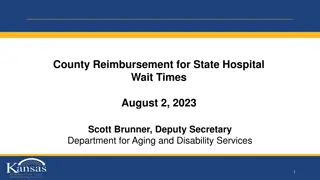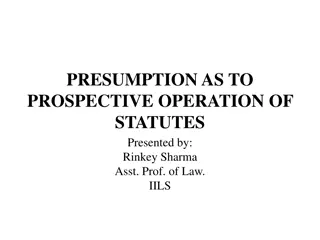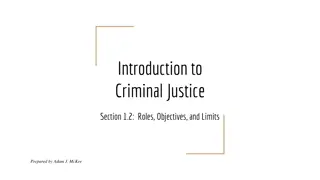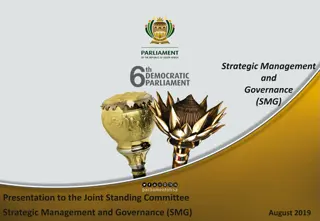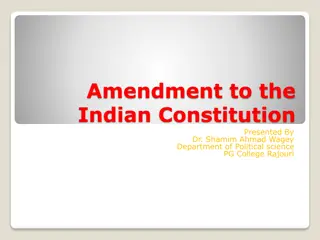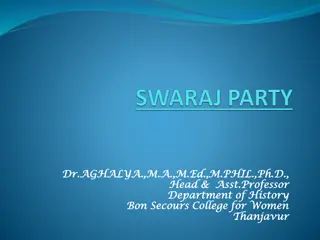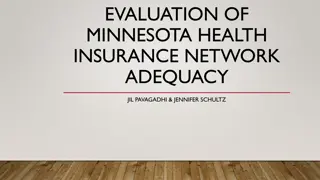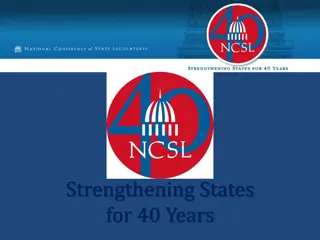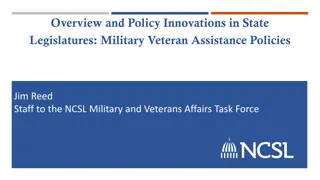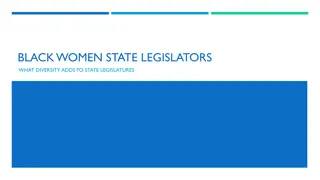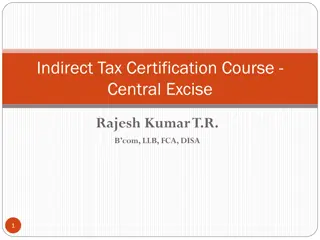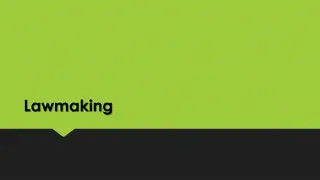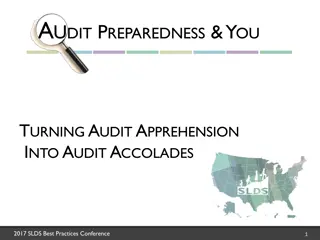Mid-Year Assessment 2023/2024: Financial Management of Parliament Presentation
Presentation to the Joint Standing Committee on Financial Management of Parliament for the Mid-Year Assessment 2023/2024. The assessment covers purposes, progress review, human resources, governance, financial assessment, insights, lessons learned, and recommendations for the second half of the year
4 views • 64 slides
State Hospital Reimbursement Programs Overview
State legislatures in 2023 passed SB 228 and HB 2184 directing KDADS to reimburse counties, healthcare providers, law enforcement, and other entities for costs related to holding individuals in custody, observation, and transportation. SB 228 focuses on competency examination and treatment for defen
1 views • 19 slides
Principles of Prospective Operation of Statutes in Legislation
Jurisprudence upholds the rule against retrospective legislation to protect settled matters and individual rights. The presumption is that laws should be prospective to avoid disrupting existing legal relationships. However, legislatures possess the power to enact retrospective laws, subject to cert
0 views • 16 slides
Understanding the Roles in Criminal Justice System
The criminal justice system involves three branches of government, each with specific responsibilities, operating at federal, state, and local levels. Law enforcement is primarily a local government function, while legislatures determine criminal laws and punishments. Statutes organized into codes d
0 views • 35 slides
Strategic Management and Governance Division Overview
The Strategic Management and Governance (SMG) Division plays a vital role in enhancing decision-making, promoting good corporate governance, facilitating strategy execution, and driving innovation within the institution. By fostering collaboration and teamwork among its components, the division aims
0 views • 23 slides
Amendment Process in the Indian Constitution: Overview and Procedure
Amending the Indian Constitution is a crucial process outlined in Article 368. It is designed to maintain the sanctity of the Constitution and prevent arbitrary power. The process involves introducing a Bill, passing it with required majorities in both Houses of Parliament, ratifying by state legisl
2 views • 7 slides
The Swaraj Party: Formation, Background, and Aims
The Swaraj Party, a breakaway group from the Indian National Congress, was formed in 1923 by C.R. Das and Motilal Nehru following the withdrawal of the Non-Cooperation Movement. The party aimed for dominion status, autonomy, and self-rule, emphasizing control over bureaucracy and local bodies. The s
0 views • 12 slides
Evaluation of Minnesota Health Insurance Network Adequacy Study
The evaluation assessed the network adequacy of health insurance in Minnesota, focusing on specific provider specialties and types. Results showed that about 41% of plans were considered insufficient, with key providers lacking in certain specialties. The approach involved data standardization, anal
0 views • 11 slides
Understanding Rulemaking and Regulations
Rulemaking is the process by which agencies create rules and regulations to implement or interpret laws. It can have the same effect as statutes passed by legislatures. This modern process, encouraged by federal courts, aims to simplify litigation. Rules are statements with general applicability tha
0 views • 22 slides
State Legislatures and Governance: An Overview
National Conference of State Legislatures (NCSL) supports state legislators and staff, covering various policy areas and offering resources like research, training, and opportunities for idea exchange. State legislatures vary in size, session lengths, and rules. States are controlled by Republicans,
0 views • 22 slides
State Legislatures Military Veteran Assistance Policies Overview
State legislatures play a crucial role in enacting policies to support military veterans and their families. Approximately 250 bills are passed annually, addressing a wide range of issues from expediting licenses for veterans to mental health initiatives. Innovations such as Green Alert programs and
0 views • 6 slides
Importance of Diversity in State Legislatures
Legislatures with higher proportions of women and minorities tend to sponsor and pass legislation that caters to the interests of underrepresented groups. However, the marginalization of women and minority legislators by their white male colleagues can limit their influence in policymaking. Intersec
0 views • 12 slides
Understanding Indirect Taxation in India: Insights and Constitutional Aspects
Delve into the world of indirect taxation in India through an exploration of revenue streams, budget estimates, tax structures, and constitutional aspects. Discover how Parliament and State Legislatures have exclusive powers to make tax laws, in accordance with Article 265 of the Constitution of Ind
0 views • 88 slides
Understanding Political Party Funding Act of 2018
The Political Party Funding Act of 2018 regulates the funding of political parties in South Africa, ensuring equitable and proportional funding for parties participating in national and provincial legislatures. The Act defines various terms such as donations, foreign persons, and political parties,
0 views • 42 slides
Understanding the Hierarchy of Lawmaking in Government
Laws are made through legislatures at different levels of government, including federal, state, and local bodies. Each level has varying degrees of power and scope in creating and enforcing laws. In case of conflicting laws between state and federal governments, the Supremacy Clause of the Constitut
0 views • 21 slides
Student Privacy Laws and Best Practices in Education Sector
Legislatures across various states are actively introducing and considering new student privacy laws, focusing on safeguarding online personal information and enhancing data transparency and security. Key themes include the introduction of privacy bills, the passing of data privacy laws, and the est
0 views • 30 slides

